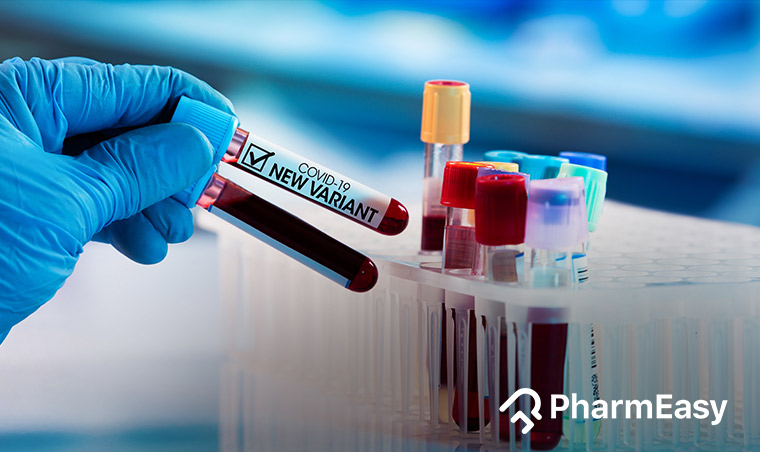Omicron Vs Delta, Beta & Other Variants – What Do We Know?
By Dr. Nikita Toshi +2 more

Get,

to manage your symptom
Get your,


4 Cr+ families
benefitted

OTP sent to 9988776655



You’ve successfully subscribed to receive
doctor-approved tips on
Whatsapp

Get ready to feel your best.

Hi There,



Register to Avail the Offer
Send OTPBy continuing, you agree with our Privacy Policy and Terms and Conditions

Hi There,

Trusted by 4 crore+ families

OTP sent to 9988776655



You have unlocked 25% off on medicines




Code: NU25




By Dr. Nikita Toshi +2 more
This article has been medically reviewed and fact-checked by Dr Nikita Toshi.

Table of Contents
Around the world, the vaccination rate is thankfully ticking up with over 55% of the population inoculated as we head into the end of 2021. In India, the same figure stands at 32% with more than 57% of the country receiving at least 1 dose. Recently, the WHO designated a variant of the SARS-CoV-2 virus as a Variant of Concern, giving it the name ‘Omicron’.
Since the Delta variant, we have all been on the lookout for what will come next and it seems our questions have been answered. What kind of threat does Omicron pose? Will we see increased lockdowns in India or around the world like when Delta first came to light? Let’s discuss what we know so far.
The SARS-CoV-2 virus, like all viruses and bacteria, constantly evolves and mutates. Mutations are common and most mutations typically do not cause any drastic changes in how the virus behaves or interacts with humans.
Once in a while, however, a mutation or change in the virus can alter its properties significantly. For example, it could impact the rate of transmissibility and change how effective the virus is at invading the immune system. This could make the virus better at infecting us. Now, since viruses are constantly changing, it would be impossible and ineffective to track every variation that occurs. That’s why the WHO uses a methodical approach, identifying Variants that need to be tracked and observed.
Variants of Concern is one category that identifies variants that can spread more easily, can cause serious illness or those that do not get treated or diagnosed easily by the existing measures as easily as existing variants. Omicron is the latest variant to receive the Variant of Concern title and was first detected in South Africa, with at least 30 countries having its cases by December 2021. The first cases of Omicron detected in India were discovered in Karnataka.
The World Health Organisation created the naming convention for variants of the SARS-CoV-2 virus, both to simplify matters and help reduce stigma. The Variants of Interest and Concern are named simply after letters in the Greek alphabet.
Technically, the variants that we watch over all have long-winded scientific names. The scientific name for the Delta variant is B.1.617.2, while for Omicron it is B.1.1.529. These are long, hard to grasp titles. To make things easy for the media and general population to understand things, the WHO uses this Greek naming scheme.
Another reason is to help avoid blame games and finger-pointing on a global scale. Often when a new variant is discovered, the country where it is first detected often gets an unfair association with the outbreak of that variant. For example, the Delta variant has long been addressed as the ‘Indian variant’.
The previous variants of the virus were designated Alpha, Beta, Gamma, Delta and so on. Although following the sequence, the latest variant was expected to be named Nu. But Nu and Xi letters in Greek were skipped and Omicron was chosen as the name for this new variant.
The WHO has emphasised time and again that vaccination remains our strongest tool in fighting off the disease as well as preventing serious illness and death from COVID-19. The organisation is working to understand the effectiveness of vaccines against this variant, however, vaccination continues to be one of the leading forces in limiting the severity of symptoms and death.
Also Read: Is Covaxin Effective Against Omicron?
There is not much we can know until the initial studies are complete and more data is collected. For new information always use trusted sources such as the WHO or government websites. Do not trust unverified information such as that found through messaging forwards and social media posts. We have no need to panic but every need to keep following the standard COVID-19 protocols. Wearing a mask, keeping physical distance, following respiratory etiquettes and maintaining proper hand hygiene should continue. And as the WHO has said, we need to continue with our vaccination efforts. Maybe we have all begun to relax a bit and that’s understandable. But this new variant comes as a reminder to stay vigilant and stay safe.
Disclaimer: The information provided here is for educational/awareness purposes only and is not intended to be a substitute for medical treatment by a healthcare professional and should not be relied upon to diagnose or treat any medical condition. The reader should consult a registered medical practitioner to determine the appropriateness of the information and before consuming any medication. PharmEasy does not provide any guarantee or warranty (express or implied) regarding the accuracy, adequacy, completeness, legality, reliability or usefulness of the information; and disclaims any liability arising thereof.
Links and product recommendations in the information provided here are advertisements of third-party products available on the website. PharmEasy does not make any representation on the accuracy or suitability of such products/services. Advertisements do not influence the editorial decisions or content. The information in this blog is subject to change without notice. The authors and administrators reserve the right to modify, add, or remove content without notification. It is your responsibility to review this disclaimer regularly for any changes.

Leave your comment...

View all comments(2)
Good
Thank you.